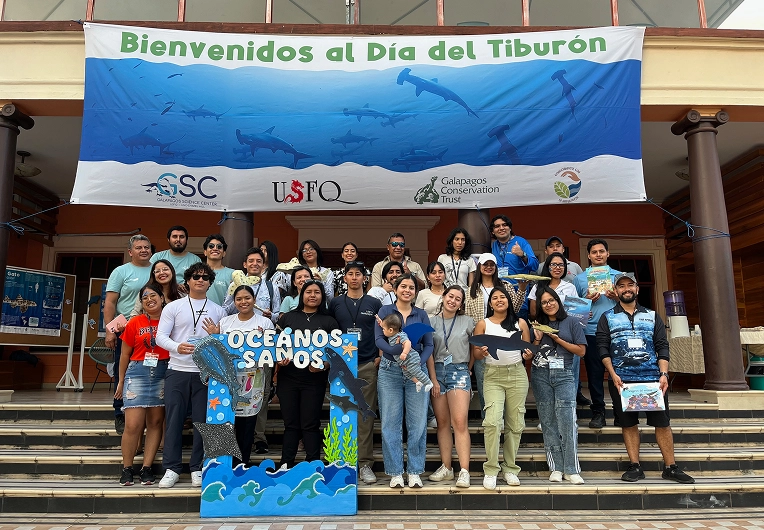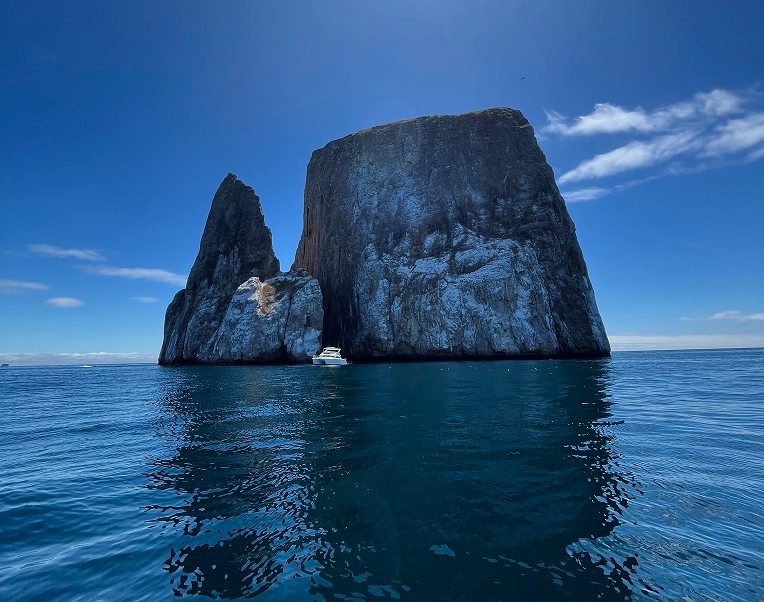Photo: Greenpeace
At the Galápagos Science Center, we believe that science grows stronger when everyone takes part. Through education, collaboration, and local action, we bring research to life — turning knowledge into positive change for the islands and their people.
Science is for Everyone
From researchers and teachers to families and students, every person has a role in shaping a sustainable future for the Galápagos. Our community initiatives, educational resources, and collaborative projects invite people of all ages to learn, participate, and make a difference.
Ways to Participate
Whether you live in the Galápagos or across the world, there are many ways to get involved in our work.
Photo: Greenpeace
Empowering local participation through science, education, and cultural identity. From school activities to island-wide events, our programs bring science closer to people and inspire environmental action.
Free educational resources inspired by the Galápagos. Access story-based materials designed to teach children about nature, empathy, and conservation — anywhere in the world.
Your contribution helps us continue research, education, and outreach. Every donation supports community programs, equipment for local schools, and new materials for our Virtual Classroom.
Our Impact
Through partnerships with local schools, families, and organizations, our engagement programs have reached more than 9,000 people across the Galápagos.
From environmental education to science events, we continue building awareness, responsibility, and hope for a sustainable future.
Photo: Joshua Vela


+9,000
Participants
20+
Community events
6
Program phases completed
Photo: Sofía Green
Collaborate With Us
We collaborate with schools, NGOs, universities, and local institutions to co-create meaningful projects. If you represent an organization or research initiative that shares our vision, we’d love to hear from you.
Together, we can expand education, promote sustainability, and protect the unique ecosystems of the Galápagos Islands.
Be Part of the Change
Join us in protecting the natural and cultural heritage of the Galápagos through science, education, and community engagement.
Photo: Romina Cox

| Cookie | Duration | Description |
|---|---|---|
| cookielawinfo-checkbox-analytics | 11 months | This cookie is set by GDPR Cookie Consent plugin. The cookie is used to store the user consent for the cookies in the category "Analytics". |
| cookielawinfo-checkbox-functional | 11 months | The cookie is set by GDPR cookie consent to record the user consent for the cookies in the category "Functional". |
| cookielawinfo-checkbox-necessary | 11 months | This cookie is set by GDPR Cookie Consent plugin. The cookies is used to store the user consent for the cookies in the category "Necessary". |
| cookielawinfo-checkbox-others | 11 months | This cookie is set by GDPR Cookie Consent plugin. The cookie is used to store the user consent for the cookies in the category "Other. |
| cookielawinfo-checkbox-performance | 11 months | This cookie is set by GDPR Cookie Consent plugin. The cookie is used to store the user consent for the cookies in the category "Performance". |
| viewed_cookie_policy | 11 months | The cookie is set by the GDPR Cookie Consent plugin and is used to store whether or not user has consented to the use of cookies. It does not store any personal data. |

In 2022, the Galapagos Science Center (GSC) and the broader UNC & USFQ Galapagos Initiative will celebrate its 10th Anniversary. We are proud to announce the World Summit on Island Sustainability scheduled to be held on June 26–30, 2022 at the Galapagos Science Center and the Community Convention Center on San Cristobal Island.
The content of the World Summit will be distributed globally through social media and results documented through papers published in a book written as part of the Galapagos Book Series by Springer Nature and edited by Steve Walsh (UNC) & Carlos Mena (USFQ) as well as Jill Stewart (UNC) and Juan Pablo Muñoz (GSC/USC). The book will be inclusive and accessible by the broader island community including scientists, managers, residents, tourists, and government and non-government organizations.
While the most obvious goal of organizing the World Summit on Island Sustainability is to celebrate the 10th Anniversary of the GSC and the UNC-USFQ Galapagos Initiative, other goals will be addressed through special opportunities created as part of our operational planning of the World Summit.
For instance, we seek to elevate and highlight the Galapagos in the island conservation discourse, seeking to interact with other island networks in more obvious and conspicuous ways to benefit the Galapagos Islands, the UNC-USFQ Galapagos Initiative, and the world. We will seize the opportunity to further develop the I2N2 – International Islands Network-of-Networks. Further, we wish to highlight and emphasize multiple visions of a sustainable future for the Galapagos Islands and we cannot do this alone. Therefore, engaging the Ecuadorian Ministry of Environment, the Ministry of Tourism, the Government Council of Galapagos, the Galapagos National Park, and local Galapagos authorities, including government and non-government organizations and local citizen groups, is imperative.

Borrowing from Hawaii’s and Guam’s Green Growth Program and the Global Island Partnership, we wish to examine existing global programs that emphasize island sustainability and their incorporation into life, policies, and circumstances in the Galapagos Islands. We will also seek to enhance our connections with the institutional members of our International Galapagos Science Consortium and expand the Consortium through the recruitment of other member institutions. We will also work to benefit islands and their local communities by working with citizen groups as well as important NGOs who seek to improve the natural conditions in the Galapagos and diminish the impact of the human dimension on the future of Galapagos’ ecosystems.
Lastly, we will use the World Summit to benefit UNC & USFQ and our constituencies through a strong and vibrant communication plan about the World Summit, creating corporate relationships as sponsors, identifying funding goals through donors, and benefiting our study abroad program for student engagement in the Galapagos Islands. We plan to develop and issue a Galapagos Sustainability Communique after the World Summit that includes the vision and insights of all its participants for a sustainable Galapagos with applicability to global island settings.
We are eager to hear your perspective and have you join us at the World Summit on Island Sustainability!